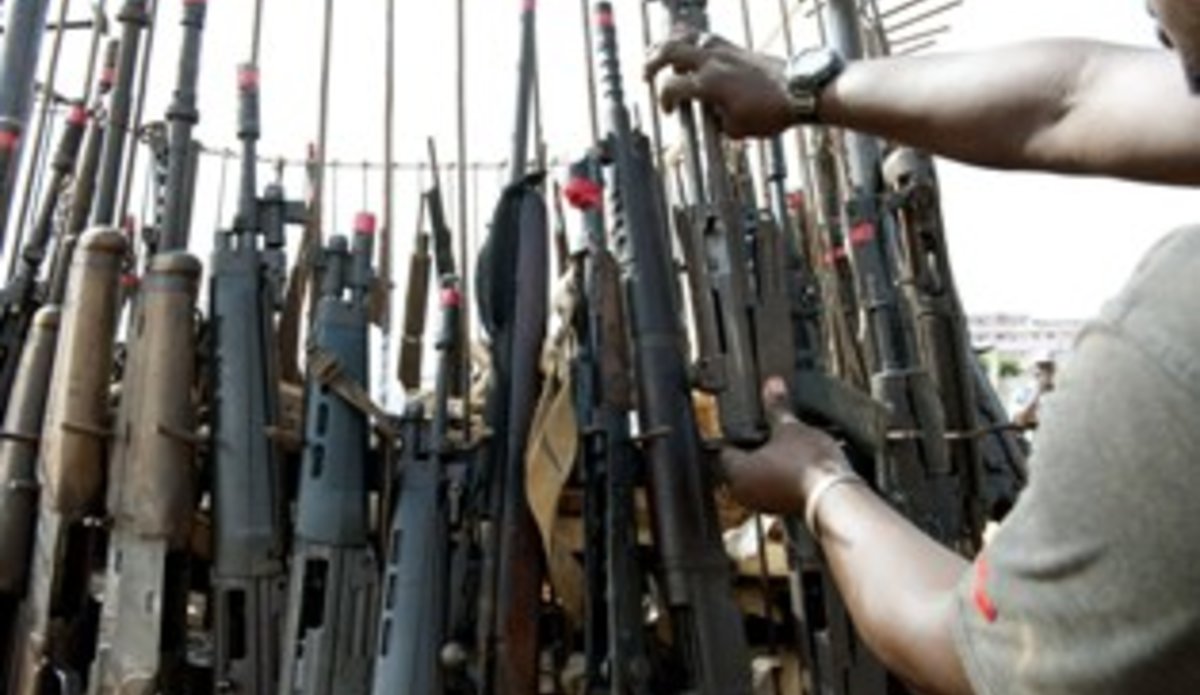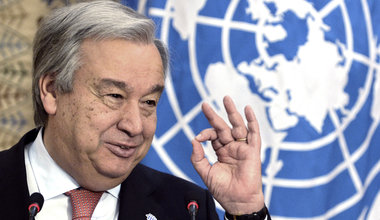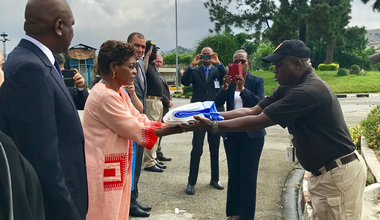Reintegration of ex-combatants in Toulepleu: UNOCI supports ADDR in its search for lasting peace

As part of its UN Security Council mandate, the United Nations Operation in Côte d'Ivoire (UNOCI) should help the Ivorian Government draw up a National Programme for the Disarmament, Demobilisation and Reintegration (DDR) of ex-combatants, and the dismantling of militia groups in close collaboration with other bilateral partners.
In order to carry out this mandate, the UN Mission, through its DDR Division, supports the Ivorian Authority for DDR (ADDR) to carry out activities aimed at ex-combatants and local populations in different parts of the country.
Toulepleu, ated at 636 km from Abidjan in the west of Côte d'Ivoire, was one of the regions that was adversely affected by the violent post-electoral crisis of 2010 to 2011, leading to a number of young men taking up arms during the armed conflict. In this part of the country, the ADDR has a lot to do.
Set up on 27 March 2013 in Toulepleu, the local office of the ADDR, with UNOCI's assistance and support, carries out several actions on the ground aimed at ex-combatants and residents in this area.
Highlighting UNOCI's support for ADDR's activities, the head of the local office in Toulepleu, Eric Kouassi, welcomed the fruitful collaboration between them and the UN ZMission. « This collaboration gave us the opportunity to make a lot of progress on the ground as soon as the office was set up. The preliminary work done by UNOCI facilitated the return of exiles in general and ex-combatants in particular, and to take into account their specific needs. It was necessary to establish a climate of trust which led to the presence of ADDR in the region being easily accepted by local people,» he explained.
In effect, as soon as the office was opened in Toulepleu, some months after the end of the post-electoral crisis, it was able to carry out important work to determine the challenges of disarmament and the security problems along the border between Côte d'Ivoire and Liberia with about 100 ex-combatants from the district of Toulepleu who had fled to Liberia. In this regards, on the initiative of UNOCI, mission were carried out to several refugee camps in Liberia. During these missions, ex-combatants were able to raise their concerns and a database was established. Based on this database, the ADDR and UNOCI were able to work together to try to find solutions to the issues raised by the ex-combatants.
Several initiatives were taken by the two organisations to start the reinsertion of the ex-combatants into civilian life. It is a winning partnership, said Mr. Kouassi, between all the entities of UNOCI and the ADDR in Toulepleu, adding that the contact with ex-combattants in refugee camps in Liberia continues. « PA lot of young people have returned and there are others are are ready to return to Toulepleu. I can tell you that these young people want to return home and we are working to ensure that this happens,» adding that working alone, the ADDR could not have attained such results.

More than 300 people have so far handed in their weapons and ammunitions, including 78 have joined reinsertion projects. These projects include one in which some 28 ex-combatants are taught how to ride motocycles, while 20 have joined training programmes with the Water and Forest Services, as well as self-employed craftsmen project which started in September 2013 and which intends to train 250 ex-combatants between now and December 2013.
Joint sensitisation and information campaigns with UNOCI have also been carried in several localities in which young people are still keeping their arms. Forgiveness and reintegration ceremonies have also been jointly organised in several communities, including one which was organised in April 2013 in Bakoubly village, the main town of the sous-préfecture. During the ceremony, ex-combattants from six villages publicly asked people for forgiveness for the actions they had taken during the violent post-electoral crisis. Ammunition collection operations have also been organised in the area with UNOCI's support.
It should also be noted that beneficiaries of the motocycle reinsertion programmes were also trained in simple accounting, civic duties and the fight against HIV/AIDS. The training, which took place in July 2013, was carried out by the Gendarmerie Brigade, the French Red Cross with the support of UNOCI's DDR office in Toulepleu.
In order to accelerate the process, UNOCI intends to initiate Community Reinsertion Projects (CRP) to support the Ivorian authorities efforts to help young people find work. These projects at aimed at 85% of ex-combatants and 15% of young people at risk. The projects will help ex-combatants find temporary work or income-generating activities to strengthen their ability to find permanent work and contribute to the economic development of their localities and the building of infratructures, agriculture and commercial activities. This will in turn strengthen social cohesion between ex-combatants and their communities leading to them voluntarily handing in their weapons.
This project was presented during a seminair organised by ADDR in August 2013, in Grand Bassam, by UNOCI's DDR division.
UNOCI and the ADDR have several projects in Toulepleu. Among these are sensitisation sessions on voluntary arms and ammunitions collection operations aimed the population. Other sensitisation activities are also planned to explain the reasons for ridding the area of arms in order to establish a security environment favourable to the relaunching of local economic activities, the consolidation of peace for development and the well-being of the population.
Vincent Kouakou
 UN
UN United Nations Peacekeeping
United Nations Peacekeeping










